#but miss the central theme entirely
Text

[alt text in ID]
Movies where if men say it’s their favorite without context…run
#film dudes who think these are there favorite movies#but miss the central theme entirely#like sir how can u claim to love goncharev but think #andrey and goncharev are super cool#and not haunted by their culture and narrative#smh#goncharov#unreality
78 notes
·
View notes
Text
and like sidenote if i can make a post with a target audience of zero. i feel like fhsy was to d20 what aa3 was to ace attorney but aa3 pulled it off better for reasons i cannot explain
#it is. the amatonormativity#^ guy who was REALLY pissed about the sandra lynn stuff#like yknow that bit in the first ep where brennan is like 'oh this drama is going down' and so like the pcs investigate it#probs bcos they think itll like kick off their new quest#and then it turns out to be like. petty romantic drama.#thats kind of a microcosm of the entire season for me#not to say there werent parts i liked (looks at the picture of baron i printed out and hung on my wall)#(and most of the leviathan stuff was brilliant and ayda is a role model for me)#but its all so tied up in the rest of that shit that i dont rlly wanna rewatch it the way ive rewatched fy 6+ times#likening this to aa3 bcos of the rlly noticeable uptick in romantic content in it compared to the rest of the trilogy#like prior to that all that rlly comes to mind is like. 2-3 and pearl's shipping shenanigans and larry existing#but in aa3 both mia and phoenix have past lovers who play big parts#theres a married couple theres tigre and viola (who sidenote i ENTIRELY missed as romantic my first playthru. i am dense)#there's the business with fawles#like it felt like romance played a large part in every case in aa3#where even when it came up in 1 + 2 it was usually ancillary (2-3 excepted but like. ppl regard that case as a fluke in most regards)#you COULD argue that maggey and adrian also inject some romantic presence in the story#but idk it just doesnt feel as central or prevalent as in aa3#like i saw a post abt adrian and celeste being cousins in the aa anime being not just the sailor moon 'best cousins' thing#but like. reinforcing the themes of familiar devotion as aa2's core. and that was rlly foundational to my understanding of the game#even tho its a change that comes from an adaptation#whereas you Couldnt make that change in aa3 without it changing A Lot of shit#where was i going with this. shrug.#the zelda and tracker relationship drama was entirely manufactured as punishing the pcs for not centering npcs#whose relationship issues were ancillary to the overarching plot they were focused on and which hadnt rlly been brought up beforehand#'why didnt gorgug call zelda :/' do u want zac to pause the kalina mystery to roleplay good relationship communication with the dm??#like its one thing looking at sy as a narrative but looking at it as a ttrpg campaign with limited time and a need to split character focus#i dont see what it did for the story besides give gorgug something to angst abt. didnt rlly feel like there was character growth or an arc#sigh. MANDATORY DISCLAIMER its been at least a year since i watched sy and longer before that since ive played aa3#but at the time my feelings were strong and have only calcified. romance as a theme in something not generally abt romance
7 notes
·
View notes
Text
i have to get this out of the way, re: dungeon meshi discussions
major spoilers ahead, obviously.
you know for a series that focuses so much on platonic and familial relationships it’s weird that dungeon meshi has attracted so much useless ship wars though. the most important driving force in the story is two sibling relationships (laios’s search for falin, thistle’s search for delgal) and one of the central themes is how loving others way too much can lead to your downfall (thistle’s desperate attempt to keep his loved ones leads to his mental state deteriorating so much he starts torturing people he claims to protect, marcille’s fear of losing her friends leads to her being easily manipulated by the main antagonist)
even with regards to falin. thistle wants to bring the ‘brother’ he raised back at all costs, he saw a young human woman as nothing more than a dragon, his tool. marcille wants to bring falin back at all costs, she didn’t care about the repercussions of using monster meat instead of animal meat even though she was an expert at ancient magic and should know why it’s such a dangerous practice.
each and every single one of the major characters has some form of tragedy with their family one way or another: the toudens, marcille and her dad. chilchuck and his wife. senshi’s entire backstory. izutsumi’s hidden desire for a mother. namari’s father. shuro and his family. kabru and his mother(both tallman and elf). mithrun and his brother. thistle and the melinis.
even some of the minor characters: flamela and her dead twin sister. the twins and the floke couple. kuro being the closest mickbell has to a family. etc etc
as someone who has reread this manga several times by now, i wonder if people just… read it once as fast as they could and act like they’re some sort of authority on fan discussion. i’ve seen people brag about reading the entire thing in one sitting as if it’s something to be proud of. this manga isn’t meant to be read that fast, that’s how you get people claiming that laios doesn’t reaaally love falin as much as marcille does.
to these people, laios just gets in the way, as if it wasn’t his idea to go down the dungeon in the first place, it wasn’t him who said his pain doesn’t matter because falin suffered more than him, it wasn’t him who felt immense guilt for leaving falin behind, it wasn’t him who found her skull, it wasn’t him who killed her to save her from her chimera form. i feel like people forget about the ‘too’ part when marcille said “i miss falin too”
marcille knows how much falin and laios love each other. that’s why she asked him if she’s allowed to resurrect her and didn’t act on her own. that’s why when both times a shapeshifting monster copied marcille to trick laios, it was what she looked like at the time she was reviving falin.
as someone who DOES ship farcille, none of the romance is canon. this isn’t meant to be anti-farcille. one of the post-canon comics is about falin gently turning down shuro because she wants to travel the world, “you can’t tie a dragon down” after all. she wants to travel the world and find herself because she doesn’t know who she is outside of marcille and laios. even marcille, who was hoping she’d reject him, tears up because of how beautiful and tragic it was.
there are a lot of ship teases because what author doesn’t like a good ship tease. but to say that dungeon meshi is a romantic love more than it is a story about family(both real and found) is a great misinterpretation of the text.
#delicious in dungeon#dungeon meshi#dungeon meshi spoilers#delicious in dungeon spoilers#dungeon meshi meta
3K notes
·
View notes
Text
Replica Anniversary DTIYS!
Well, it was one year ago today that I started Replica! It’s been a wonderful experience so far and I wanted to do something fun to show my appreciation to you all! So in celebration I want to do my very first DTIYS, but we’re going to do this one a little differently.
YOUR MISSION: to design a comic cover for the upcoming Replica Holiday Special that is all about the birth of Casey Jr:
The year is 2028, eight years before the start of Replica. The Central Park Colony is still going strong and the turtles now must protect an expecting Cassandra Jones from the very people they are sworn to defend.
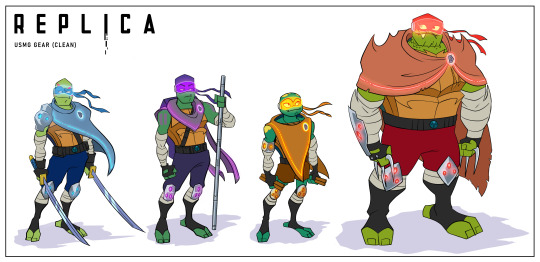

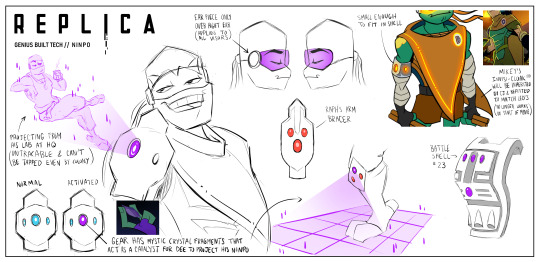
As far as theme that is entirely up to you! I’ve always found comic covers to be fun because they don’t necessarily have to show what happens in the actual story. So if you want Casey Senior holding up Junior on Pride Rock, Lion King style? That’s great. You want to do an epic pose of the turtles battling Krang while trying to defend the Caseys? Perfect. You want to have Casey Junior bursting out of a Krang’s stomach like a Xenomorph??? Okay weird, but I’ll accept it so long as it’s not too gory! Also the cover doesn’t have to be Casey centric, I just want to see what you all come up with! (Note: please no NSFW art)
I have included character sheets and some visual development as reference for how the characters will look at this point in the story (though you do not need to strictly follow it. Feel free to give it your own artistic twist). I will also include a PNG of the logo in case you have a vision for how you want it to be incorporated. Note you don’t have to use the logo but if yours is picked as the winner I will be putting a logo in there somewhere!

PRIZES:
3rd Place: an OC of yours will get to be a bg character in Replica (note the character cannot be an AU version of one of the main cast for obvious reasons).
2nd Place: a black and white commission of one character of your choosing.
1st Place: your cover front and center in the Replica lineup (with credit of course) as well as a 1-2 character commission w/ color (please no nsfw requests for either commission).
DUE DATE: NOVEMBER 19 (gives you all 2 months)
IMPORTANT: please use #replica DTIYS hashtag for easy search
Also please DM me with your finished cover on Tumblr (otherwise I might miss it!)
NOTE: while not mandatory you’ll probably want the piece to be around the typical comic cover vertical 2:3 ratio (10x15" for example).
DISCLAIMERS:
I’ve never done an event like this before so I’ll admit I’m a little nervous. Don’t know if this will even gain any traction but I just want people to have good time and get creative :)
This is all just for fun so please do not push yourself too hard!
Let me know if you have any other questions and have fun!
#replica DTIYS#kathaynesart#rottmnt replica#replica#rottmnt#save rottmnt#rise of the teenage mutant ninja turtles#unpause rise of the tmnt#bad future rottmnt#tmnt#future leo#future raph#future mikey#future don#future cassandra#rottmnt casey jr#casey jones
2K notes
·
View notes
Text
One thing that I think a lot of Disco Elysium meta misses (likely because a lot of it is very clearly written by young Americans writing from an intensely American-centric cultural perspective without even really realizing it) is that one of the singular and central themes of the game is massive-scale generational trauma in a home that is economically collapsing as its resources and people are being drained by an occupation. People have noted that no one tries to help Harry, despite the fact his mental illness is incredibly obvious to everyone around him. He tells Kim that he completely lost his memory, and Kim politely asks him to focus on the work. He tells Gottlieb that he had a heart attack, and Gottlieb tells him that if he’s still alive it couldn’t have been that bad. That he’ll drop dead sooner or later, but then so does everyone.
And that’s the most important thing: so does everyone. Look at Martinaise. Look at the world in which Harry lives. It is not our own, but it is adjacent to ours. More specifically, it is clearly adjacent to the states of the Eastern Bloc: overtaken and occupied by a faraway government that clearly doesn’t care about Revachol or its people. And that is obvious in every tired face, every defeated citizen, everyone trying to eke out a little happiness or meaning in spite of the overwhelming trauma and damage around them. The buildings are still half-destroyed. The bullet holes are still in the walls. The revolution was decades before, but it still feels to the people there like a fresh wound. The number of men of Harry’s generation who are not alcoholic or otherwise deeply fucked up are very few. Some, like Kim, hide it better, but the deeper you dig into his history, the more you realize how damaged Kim is. He’s more than a little trigger happy, and hates that about himself, but he is a product of his environment: Kim’s entire life is seeing people he cared about shot and killed, so his instinct now is to shoot first himself, to protect those few people left who still matter to him.
Harry is not unique in his trauma. He is a distillation of an entire culture of people who tried to rise up and make something beautiful, and were instead routed and occupied. He is trapped between the occupation and the people on the ground, along with all the rest of the RCM. Their authority comes from the occupying government, but it is implied that they were formed out of the remnants of the citizens militia which sprung up from Revachol itself as a way to try to mitigate some of the horrors being committed on its streets. The Moralintern sure as hell wasn’t going to get their hands dirty, so they happily conscripted (and therefore could better control) this group, who are only recognized in certain places, and whose authority mostly amounts to giving out fines. The RCM is corrupt, but it is corrupt in the same way its culture is. Bribes are considered standard with them, not a moral failing, but a necessity, so long as those bribes are correctly logged as ‘donations’. It’s how the RCM stays afloat, and the rest of Revachol completely understands that. Everyone would take a bribe if it meant they kept eating. Everyone would take a little under-the-table money if it meant keeping a roof over their heads. The officersof the RCM certainly don’t make enough to see a doctor. They have an in-house lazarus, and if he can’t fix them they just die. Mental health care? What mental health care? Harry doesn’t get it for the same reason no one else does: it doesn’t really seem to exist. There are no counselors, no psychologists, no psychiatrists. How would they even start? If the world is what is broken, if everyone is suffering a similar catastrophic amount, it makes sense that Harry’s trauma would simply get rolled up with all the rest. Kim asks him to get on with the job because Harry’s suffering is not remarkable in Revachol. He is one of an entire generation who have an astronomical number of orphans from the revolution, and so many younger people are left more or less orphans as their parents drink themselves into oblivion like Cuno’s father. So Harry’s truly unique attribute is embodying all that trauma, having it all inside of him, filling him to bursting.
To really engage with the themes of the game, engaging first and foremost with the reality of Revachol is imperative. Imposing our own reality onto Revachol, particularly if coming from an American perspective (which tend to have the habit of both viewing the world through an American lens and not realizing they’re doing it because they’ve never experienced a different lens), will always feel shallow to me because of this.
All that is to say, I would love to hear some more explicitly European meta about this game, and especially Eastern European meta. If anyone can point me to some good, juicy essays from that perspective, I would be grateful!
#Disco Elysium#is such a good game#but I found a lot of the meta around it frustratingly shallow#and very VERY American#which is also frustrating#given how clearly Eastern European the roots of this game are#I have no problem with people using a game or other work of fiction to inform their own lives and experiences#but I find it strange when people engage with the game#as though it was coming from an American perspective#asking why certain things happen or didn't#based on how they would play out or have played out in America#anyway this a rambly way to request some meta from other cultural perspectives#I am very interested in reading it!#Disco Elysium meta
3K notes
·
View notes
Text
As much as I love Disco Elysium, I think I was not prepared for Sacred and Terrible Air. Of course, I was expecting to know more about the world of Elysium as a whole, and Robert Kurvitz is a very good writer, but the thesis of the novel (and how it makes its points) flash-banged me.
Disco Elysium this is not, and it wasn’t supposed to be, but I think I can understand better now what the team at ZA/UM was getting at with this specific setting, and these specific narrative angles. Kinda messy, because it’s been a week since I finished it, but here are some things I’d like to highlight:
1. The pedophilia. I surely wasn’t expecting this to be such a central theme of the novel, but a lot of its main points revolve around it. The most interesting use of this, as a narrative device, is how the girlfriend of Jesper basically accuses him of being a pedophile because he cannot relate to the adults around him. He’s still obsessed with a girl he met when he was 13 years old, and fetishizes a scrunchie he stole from her bag two decades ago. Yeah, I guess Jesper, well into his thirties, is still in love with a 13 year old girl. His girlfriend is almost half his age, and they started dating when she was 15 years old and a lingerie model (!). Zigi mentions how pedophilia was a bougie disease, and well… That idea went right into my thought cabinet (I call it “Bougie Babies for Sale).
Still processing it.
Now, let’s go back to the rest of the main characters. With all this in mind, a pedophilic overtone covers their interest in these four missing girls, but Jasper is the only one who acts on it, sort of. Khan remains in a sort of arrested development (he still uses a shirt he had when he was 13), foregoing normal adult relationships, and Tereesz joins the police as an investigator with the idea of still finding them some day (essentially letting these eternally prepubescent girls define his entire existence), leading him to a very dark path. I wonder if the brutality they afford to the “actual” pedophiles in the story (Vidkun Hird and the Linoleum Salesman) comes from the realization that they are not that different?
2. Obviously, though, this fetishization of the Lund sisters is also a fetishization of the past. The novel states it in the first few pages; they disappeared twenty years ago, in a time that most conservative people remember as the “good old days”. Basically their version of the American Fifties. Now, being obsessed with the past is a running theme in both SaTA and DE, but the angle here is different.
I already said it: the past is not remembered, is fetishized with an almost sexual yearning by a lot of the male characters of the book. They want to be consumed by it (and lucky them! It will) and do nothing more than serve it. It reminds me of a poem by Yamil Nardil Sadek, which, translated to the best of my ability, goes like:
She awaits me
sitting on the bed,
wearing leather,
and armed to the teeth,
the Memory.
Yeah, that sums up Sacred and Terrible Air pretty well. Everyone is being consumed by the past, bite by bite, and enjoying it. Vidkun Hird, by the mythologized version of his tribe’s history; Sarjan Ambartsumjan, by a miniature ship model that requires constant, devoted thought or else it will disappear, the three main characters by the memory of that summer with the Lund girls. Even the Linoleum Salesman is being haunted and consumed, of sorts, by his sickness and dementia that only sometimes let him take a peek of the past. Beyond that, there are very few characters that do not spend time being followed by relentless ghosts. Literally, in the case of Zigi. Which brings me to…
3. The Pale. It was a really cool concept in Disco Elysium, and it’s an existential nightmare in Sacred and Terrible Air. It always was, really. But here it lets you take a look into it in a way that’s applicable in real life. The Pale is a metaphor for many things, but actually for a single one: A world where our current Capitalist reality facilitates both apathy and yearning for better days, often idealized in our collective pasts.
My favorite scene, one that was incredibly puzzling but so obvious in retrospect, is a beautiful speech by the ghost (?) of Ignus Nilsen to Zigi. I will just paste it here:
“I said terrible things, yes! I stood on a white horse, in a blizzard, and gave speeches. In the mountains, on the construction site… I swung my sword, with silver sunbeams on the hilt. And all around me fluttered white flags, crests of crowned horns made with silver thread, a pentagon between the prongs of the horns, the branches raised to heaven. Everyone who came here with me became happy, Zigi! Communism is powerful! Believe in Communism, it’s a burst of enthusiasm! I promise! It’s beautiful when you believe in a person, but without it…!”
“Without it, there is nothing.”
“Nothing. It was a blizzard, but it was bright, it was morning. Communism is white, it sparkles! Communism is the morning, it is a jubilation!”
The Pale begins to recede dangerously around the entroponaut.
The fucking Pale recedes with talk of Communism! At first it might appear a little heavy handed (yeah, Communism, by itself, could save the world). But then I got into how Communism could be a solution to the antipathy and chronic nostalgia that sustain Capitalism, and then it hit me. Nilsen, a literal ghost from the past, is talking about a future that could have been. That he wanted to accomplish. That people, probably, can still achieve. The Pale is not eternal, it can be pushed back. Because the Pale seems to subsist on the past, it abhors any talk of the future. A better future. That’s how we solve things, and for a central thesis, is not bad at all.
With that being said, and because I’m just rambling here while pretending I’m working, there are also some things that I just didn’t understand, but maybe it was because of the translation. The original novel is written in a very poetic style, and some of that is still here, but I still need to untangle…
1. The Man. It is said that the day the Lund girls disappeared, they were joined by a mysterious Man that nobody seemed to remember correctly. A character even suspects that she was remembering wrong. Now, the Pale erases people and memories retroactively, so maybe it had something to do with it, but… Who was that? Is there any theory about that Man, or I just missed something? Some scenes and narrations were tough to parse for me (my primary language is not English).
2. Was Malin Lund pregnant? That flash with the fetus was sudden and weird.
3. What was the significance of the three meat piroshkis? They mention that it was unusual that the girls bought them (and if you do the math, you can realize early on that they were not planning to get back home. That purchase didn’t leave them enough money for the bus fare back), but that’s it. Were they for the Man? Also, the narration mentions that Lund girls’ picnic basket contained “the kind of things girls like to eat”, so maybe they were planning to see the boys and bring them the kind of things boys eat? I’m overthinking that? The chapter actually titled “Three Meat Piroshkis” just left me even more confused.
4. I don’t understand how Khan’s pen works at all. The one he brought to the school reunion. That was the part I re-read the most.
Anyway, even with that, I loved Sacred and Terrible Air. Definitely one of the most enthralling reads I had, with or without the background of Disco Elysium. I’d still like an official translation that could potentially solve the issues I had, but for now, a Top 10 Book for me.
Go for it now.
309 notes
·
View notes
Text
On Yuuri's "top-secret" love life
I took the time to look deeper into the information YOI gives us about Yuuri's history with love and what it means for the story of YOI.
Let's start from the scene in which Viktor introduces the two Yuris to their new short programmes:

It struck me as curious that a 23-year-old has never thought about love. The average person has their first crushes in puberty, enforcing a first examination of the subject of love to some extent.
YOI portrays Yuuri as being evasive when feeling pushed or embarrassed, but when Viktor asks him whether he ever thought about love, all we get from him is this utterly clueless expression. In this context, his interpretation of Agape is very interesting:

Yuuri is projecting his own experiences with love into his interpretation of On Love: Agape and Eros. This becomes even clearer when he comments Eros with nothing but "It's a totally different song". I've discussed this in more detail here, for this discussion let it be suffice it to say that his answers reflect where he is currently at in his journey of exploring love.
Japanese language uses different words for different kinds of love. The general all-encompassing concept of love is 愛 ("ai"), the romantic/passionate love is 恋 ("koi"). These terms very roughly approximate the Greek concepts of agape and eros as they are utilised in YOI. However, YOI doesn't draw the distinction between 愛 and 恋 , but discusses love as 愛 ("ai") that entails other forms of love, including even eros せいてきな愛 ("sexual love").
Until the moment Viktor introduces both Yuris to their new short programmes, Yuuri has never wasted a thought on love. Which means:
Until the end of episode 2, Yuuri has never had romantic feelings for another person.
Why can we be so sure of that?
Even a first crush enforces an examination of love; the result of that is often very naive and immature but becomes more complex and nuanced with experience. The romantic feelings that come with a romantic crush are impossible to miss since they take over one's heart and soul like wildfire. Even if one's feelings aren't reciprocated or one decides to not act upon them, an examination of the subject "love" inevitably happens driven by heartbreak or the sentiment that it's better not to pursue this person and wanting them to be happy.
Therefore, if Yuuri had experienced such feelings before episode 2/3, he would know. And we would know, too, because it would impact his views on love, how he tackles his season's theme, and how he goes about his relationship with Viktor. Since love is a central theme in YOI, a past love, whether it had been happy, tragic, or unreciprocated, must be addressed in a way that does it justice because it would affect the entire course of Yuuri's character journey. It would require an exploration of past Yuuri either being happy with a past lover, or heartbroken because the relationship ended or because the feelings were one-sided. And this would alter his approach to his season's theme and help him figure out his feelings for Viktor because he would already be familiar with it. However, YOI does nothing like that. Instead, it introduces us to the extent of Yuuri's obsession with Viktor in a lengthy flashback, which is the start of a long-term parasocial relationship that is very gay-coded but too abstract to qualify as a romantic crush (see also here). The only flashback into one's love life in the entire anime is, of all things, about Georgi as a contrasting juxtaposition to viktuuri.
For the story of YOI to work in the way it does, Yuuri never having had romantic feelings is crucial.
Yuuri shows all the sings of a monotropic mind. Since he discovered Viktor at the onset of puberty, his entire existence revolved around Viktor as the anime shows us in abundance. For his endeavour to meet Viktor as an equal on the ice with the GPF being the disastrous culmination of his efforts, he even went to a training facility abroad. Such a strong focus doesn't particularlry motivate people to forming deeper connections and let's not forget that Yuuri is an introvert. He is more interested in skating (to pursue Viktor) than spending time with his friends, not that he's great at forming relationships in the first place because Yuuri is also super awkward.
Sometimes, friendship, admiration and aesthetic attraction (aka finding someone pretty, cute etc.) are being misconstrued as romantic feelings due to allonormative/amatonormative paradigms. While it's true that starting from a young age, Yuuri idolises people who inspire him (憧れの人 = "someone to look up to/admire", in the subs translated as "idol"), Yuuri's in both cases very gay-coded admiration holds no romantic or sexual connotation, except for the parasocial romanticism in his lifelong quest to emulate Viktor and become his equal (not that the parasocial is the aspect here).
The press conference at the end of episode 5 comprises Yuuri's journey of exploring love and provides a deeper insight in his views on love.

Since the subs are low-key confusing, I'm not quoting them, but you can check this translation done by a Japanese fan that explains all the nuances the official translation misses. The part I want to point out in particular is this one:
My love. It’s not [general] love or romantic love that is easy to understand, but my bond with Victor, and the lukewarm way I feel about my family and my local community.
Note that this is the only time the anime uses 恋 ("koi"), probably because he's speaking to a Japanese audience.
This is the part where his friends feel offended. It showcases how Yuuri feels about the other people in his life, confirming what we could already guess: that none of these people ever reached a level at which he would develop intimate feelings for them and let them into his heart in one or the other way. All the people who supported him, first in Hasetsu and later in Detroit. Let that sink in. That's why before Vikor became he coach, he always felt that he was always fighting alone. (I don't blame Yuuri for his poor wording because it would only downplay his mental struggles and their ramifications.)
Yuuri talks about the concept of love as a whole, showcasing that he has come a long way from episode 2 and now has reached a stage where he has a mature and nuanced idea of it. He reveals that he grasps romantic love (恋) and general love (愛) easily, which is another huge progress compared to his absolute cluelessness in episode 2 and another hint that he hasn't yet experienced a situation that prompted an examination of the subject prior to it.
At the same time, Yuuri draws a clear distinction between his feelings for his family and friends and his feelings for Viktor, which aren't lukewarm at all.

A more accurate translation of this line is: "The first person I want to tie myself to and never let go is Viktor". Here, the fan translation explicitly points out that the phrasing is a reference to the scene in episode 2 when Viktor learns from the Nishigoris about Yuuri's struggles to form friendships and to be more interested in skating than in spending time with his friends. (Having written all this, I wonder how much he considered his friends as friends in the first place because philia is also a form of love that is implicitly included in "ai".)
After months of getting to know Viktor intimately, Yuuri has fallen in love with Viktor at last. This feeling is bigger than any emotion he has experienced before because it's greater than 恋 and 愛 and because of that:
This feeling doesn't have a name, but I decided to dare to call it "love".
Although Yuuri is awkward and anxious, there is one quality that stands out above all: his ambition to pursue a goal he is committed to. For half his life this has been Viktor, first as an abstract concept and as an ideal to strive for, later as a romantic interest. If he wants something, he makes sure to get it and he's unstoppable in his pursuit even when he hits rock bottom his desire to skate on the same ice as Viktor again right before Viktor showed up proves. If Yuuri had had romantic feelings for someone else, he would have pursued this person or ruled out the idea because Viktor was more important, which would have impacted his views on love either way.
Or in other words:
Viktor is Yuuri's first love.
Yuuri's love life is not as secret as YOI claims it is. His refusal to discuss it when Viktor pried for information, suggests embarrassment about the fact that at the age of 23, he is totally inexperienced in this regard while other people already have children or had a couple of partners. He's definitely not embarrassed to show the world how much he loves Viktor.
I will discuss the gay-coding of how Yuuri idolises people that inspire him in another post because this seems to be one of the lesser known facts.
Disclaimer: This analysis is based on what is supported by canon. Of course you are free to headcanon Yuuri as having had crushes before Viktor, but keep in mind that this would alter the plot of YOI to some extent.
#yuri on ice#yoi meta#yuri on ice meta#my yoi meta#katsuki yuuri#viktor nikiforov#yoi#yuri!!! on ice#viktuuri#another post that took me some weeks to write
128 notes
·
View notes
Text
actually its kind of crazy how little we actually see the starblaster crew interact with each other. like other than tres horny boys and each of the pairs in that trio, and like, arguably lucretia and thb, barry and lup, and lup and taako, most of the relationships between the crew are only a few lines, if anything? like obviously in-universe they're all really close and griffin says that (time enough to grow indescribably close), but there's a lot we don't see. like, taako & barry, for example, have a handful of moments, lines we can point to that show they are really close (you're my family, taako, can i speak frankly?), but as far as actual screentime, there's really very little.
and even those i mentioned before, like, lup has more screentime with barry and taako than with anyone else, there's the whole little legato monologue about her and barry's relationship and she has (comparatively) a lot of scenes with taako, but also, as a character, she's only around for maybe a sixth of the show, so there's just not a lot of time to work with?
and that's not to mention the relationships we can figure were probably present in-universe, but literally never see, like lup & davenport. and on that note, i actually can't think of any other pairs who don't interact at least once, but still, very rarely. like now i'm considering davenport & barry. who we hardly see but there is the fact that barry cast command on him to drink the ichor. it's one line in the show and the implications are never really mentioned but there's a lot of significance to be wrung out of this one tiny interaction. barry condemns lucretia's methods of stealing agency from their family in the service of the greater good, but when he thinks it's best for davenport, does the same on a smaller scale? barry doesn't have the time to try to convince him to drink, he needs davenport back to himself now, because davenport is someone dependable, a leader, someone who barry knows will be capable and decisive and relieve him of the responsibility he's been shouldering by himself? that barry knows davenport won't begrudge his use of the spell, because he'll see it as pragmatic, necessary, assistance, and forgive him for it? none of that is necessarily supported in canon but it can be extrapolated from, again, kind of a throwaway line.
the non-thb crew have presence and are important to the narrative, but most of that comes from thematic significance rather than them as individuals, you know? we hardly see lup and barry and davenport (maybe arguably lucretia too, though we see more of her than them), but we see the echoes of their decisions and their goals and their love for the rest of their family and the way they shape the story.
but actually, even that's not entirely accurate, because as significant as they are in that way, their presence isn't only due to that, they're full characters too. they have personalities and depth and connection, they're not only plot devices. like, maybe griffin needed to explain why lup was missing, and that's why she became a lich, and her needing to be a lich is why she and barry had their romance, but also, if that were all there was to it, the legato monologue wouldn't exist, the best day ever wouldn't exist. those are scenes designed to build lup as a character through her connections to other characters and to the central themes of balance, not to fix plot holes. it's just that all of that character building takes place in a pretty small fraction of the show compared to tres horny boys, who have the entire thing. idk its interesting and impressive how some of the deepest characters and most profound relationships were developed in a very short amount of time
#mine#balance#taz#taz balance#analysis#and by profound relationships i DO mean the twins its still crazy to me that the mcelroys were able to make that work#introduce a new character who is absolutely fundamental to another established character's identity and have it make sense and feel right#in just the way that getting memories of lup back feels right to taako. like everything's slotted into place. like she was always there.#like we were missing her the whole time and didn't even know it. just like he was#but of course i also mean the whole crew together all seven birds#in a similar way. it just feels right that they're all together. it just feels right that they're a family.#when we find out it all feels like it was true the whole time#even when we don't see all the details of it the foundation is there. so when griffin says it's true we don't doubt it#anyway. all that to say. its funny how convinced griffin is at first that he'll be a terrible dm when he's actually a very good storyteller
90 notes
·
View notes
Text
seeing all the crazy stuff people build in totk kinda ... it feels like that is also a factor in why it turned out like this, like the insane things people did in botw and the (i keep saying devs when i actually mean the directors .. producers?) directors saw it and build totk just around letting people do it all 100 times more
to be clear, i think its impressive as hell what some people build (i just saw like .. a movie scene with a functioning mech gozilla and tanks made with totks building stuff ... what the fuck) and those things go pretty viral (understandibly so) but i also gotta question
as creative, free, and impressive as it is ... should that have been the focus in a zelda game? like .. is building mechas and tanks like that something that should be in a zelda game? can it be in there without inevitably sacrificing so much else? theres building games just for that? and if you want to make it zelda themed you can make it a spin off?
like i get it, people did crazy things in botw, they saw what people had fun with and dialed it up to a 1000 in totk, which in itself is not bad, even pretty good if you consider gamedevs and feeback and all that bc in general you should embrace what people had fun with in your game even if it wasnt the intent, given that nintendy listens to feedback (perhaps even a bit too much at times) and creative solutions was a central point to botw design philosophy but
i feel like totk kinda .. missed the balance?
if its really a reason why totk is build around enabling that in a purely player centered toy box kind of way without it actually mattering in the story .. or even themes ... was it worth it?
not to sound like an oldschool boomer tm but in a franchise that iconic, lore and story focused, should you really abandon nigh all lore/story cohesion just to give the player a big box of toys in a world where i feel that doesnt ,, really belong? in a direct sequel in the same world with the same characters no less? that point is perhaps the biggest issue with it, bc again lots of games even if somwhat a sequel, had strange new tech or things in the world but in all of those cases it was some alternative universe, millenia after the other game, or on an entire different continent; while totk is supposedly just a few years after botw in the very same hyrule
(still doesnt explain the erasing of all shiekah things and replacing it with sonau- tho suddendly revealing the shiekah had actual rockets, wheels with suspension and grenade-launchers, might have been confusing too- you could have enabled the player creativity with shiekah too imo, and personally i would have found it way more fun ... lil guardian leg crawlies ..)
having thought about it feels rather logical why they did it in alot of ways, but also ... totk is build around it, while its also not build around it at all- its build around the PLAYER, not the world, not the story, not the theme, not the character, but YOU
(especialyl those that dont realyl care about anythign story or lore stuff and just want to have fun with the gameplay loop, which isnt wrong, but i question whether thats the right kind if player to center in a zelda game .... also not saying all of those that build these crazy things are like that but- ... i hope you know what i mean)
(i know games are always build around the player, or should be, but .. do you get what i mean????? playing in a world that doesnt make sense anymore bc its all a box of toys yeeted into my face isnt fun to me, bc im here not only for gameplay fun but for the world .. theme .. characters, its something that has to be harmonical as a whole for me and totk just .. isnt)
i say it alot but i do really mean it, its very difficult to get my thoughts and feelings written out and to have them come across correctly
#ganondoodles talks#zelda#totk#ganondoodles rants#maybe i need to stop doing these rants#even about the little stuff#at this point it probably seems like im just finding another detail JUST to rant about it#its a struggle between being so .. SO frustrated with this game and trying to understand WHY it is like this#be assured tho my ranting days are pretty much over at this point#i have gone about pretty much all my points#tho i guess sometimes there will be more little things#...........or more interviews that get released....
260 notes
·
View notes
Text
"Repent and Make Efforts"
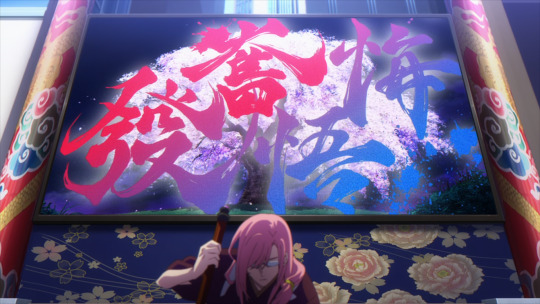
Kaoru's calligraphy display in episode 5 is very obviously targeted, but between natural difficulties in translating idioms, changes made in the English dub, and misunderstandings of the general meaning of "repentance", exactly what he's communicating often gets lost in translation - which is a shame, because it's not only a very telling moment about Kaoru's own feelings about Adam, but one that ends up being very important to the themes of the entire show and many of the central character arcs.
To give some quick establishing information, what Kaoru is writing in this scene is a called a yojijukugo (四字熟語), or four-character idiom - set idiomatic phrases that are very similar to (and originate from) Chinese chengyu (成语), which you may be familiar with if you've read any linguistic analysis of danmei. Four-character idioms are very common subjects for calligraphers like Kaoru, and the ways they can be used in speech make them very difficult to translate concisely. The particular idiom Kaoru has written here, read from right to left, is 悔悟奮發, a real four-character idiom (though usually written 悔悟憤発 in modern Japanese - Kaoru is using the Chinese hanzi.)
Read kaigo funpatsu, both the Crunchyroll subs and the dub translate this as "repent and make efforts", which is... fine enough given the complexity of translating yojijukugo. It's quite a literal translation, looking at the phrase broken down into its components - 悔悟 can indeed be translated to "repentance", and 奮發 means "to exert oneself." As an idiom, it means "to regret one's mistakes, and work hard to recover." It generally refers to remorse, but can also mean coming back from a loss. In this exchange from a Japanese website explaining the use of the idiom, it's used to describe recovering after a loss in a competition:
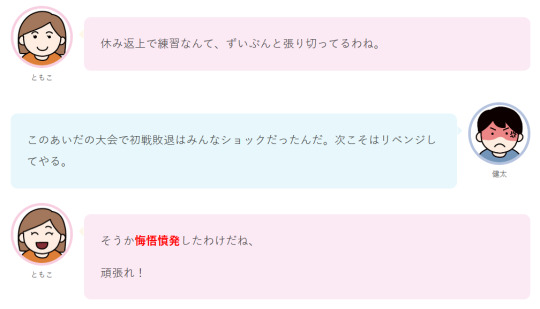
Tomoko: You must be in high spirits, to be practicing on your day off.
Kenta: Everyone was shocked when I was eliminated in the first round of that tournament the other day. Next time I'll get my revenge.
Tomoko: Oh, so you're trying to make a comeback*, good luck!
(*in a perfect example of how difficult yojijukugo can be to translate when used in regular speech, a translation as literal as "repent and make efforts" would sound very silly in English here.)
And this idiomatic meaning is how Kaoru explains it - and where I believe some misunderstandings are originating from, both due to the overall interpretation of the word "repent", as well as changes in nuance in the explanation given in the dub. To begin with, let's look at Kaoru's dialog in Japanese. (Due to him immediately explaining the meaning, I chose to leave kaigo funpatsu untranslated, unlike the official subs.)
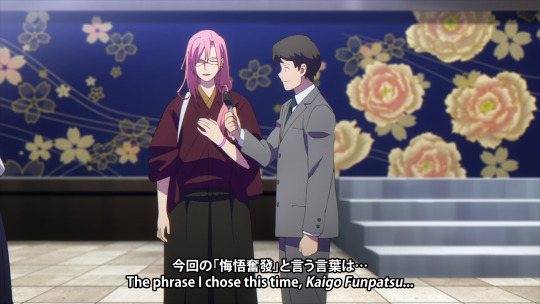
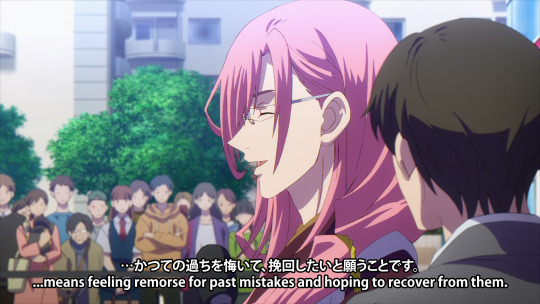
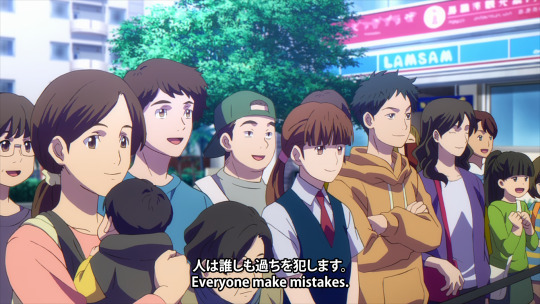
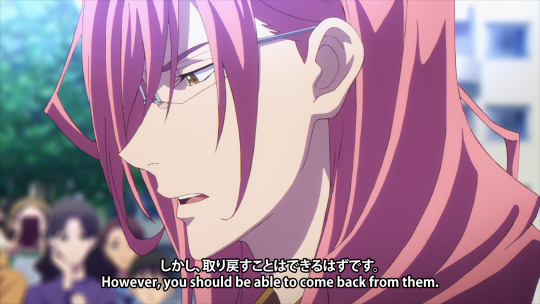
And the same dialog in the dub:
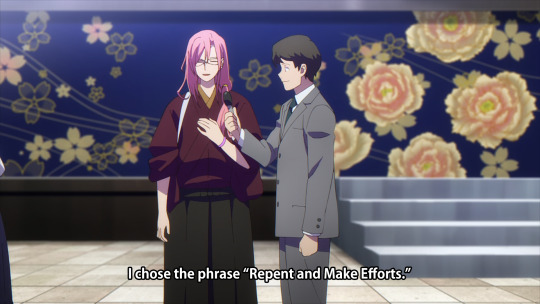
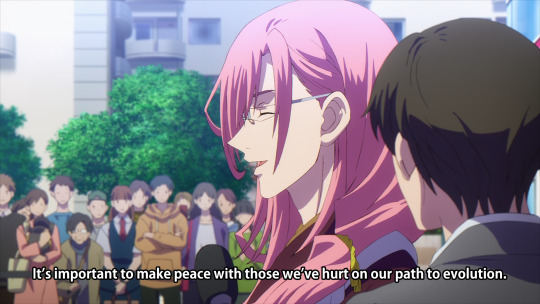
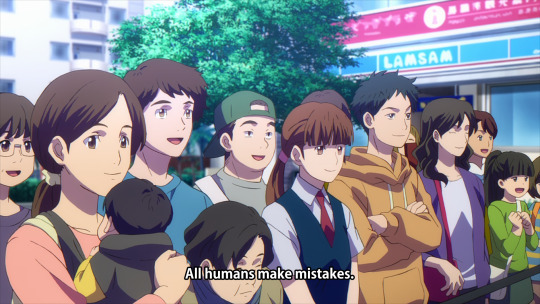
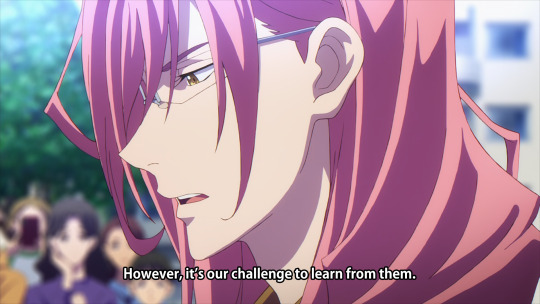
It should be apparent just from this that Kaoru in the original and Kaoru in the dub are saying completely different things. Originally, Kaoru makes no mention of making peace with people that have been hurt, because that isn't what kaigo funpatsu is referring to. Kaigo is personal, internal regret - kaigo funpatsu is about self-reflection, recognizing one's mistakes and striving to do better, considering your past in order to take your next steps in the future. That could involve making amends with wronged parties, but it's not part of it inherently - Kaoru's original dialog doesn't even allude to people being hurt at all, because it's not relevant to the idiom.
It's here that I believe the word "repent" is causing some trip-ups: it's being taken in the Christian sense of atonement or penance, an action done to achieve forgiveness from others or redeem oneself for sinning, but Kaoru is simply talking about realizing you've done something wrong and feeling remorse for it. (Or, specifically, about Adam realizing he's done something wrong and feeling remorse for it.)
And while his last line in the dub is at least a bit more in the spirit of kaigo funpatsu, it's still missing what is at the heart of Kaoru's feelings about this idiom, and about the man it's clearly targeted at - the idea of coming back from one's mistakes, something that does not come up in the dub at all. The first word Kaoru uses, bankai (挽回), does mean "to recover", but also "to regain what was lost" or "to return to the original state." Torimodosu (取り戻す), as well, specifically means to regain something that was lost - in fact, it's the very same word Tadashi uses when speaking of Adam "regaining his love."
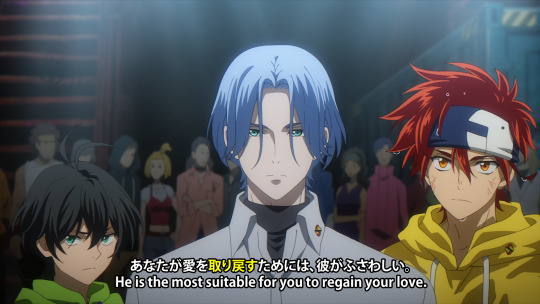
Kaoru is not asking Adam to personally make things up to him, or to anyone - Kaoru, at heart, believes in Adam, and believes that he can, and should, still come back from everything. Even in the finale - after the Full Swing Kiss, after his naive hopes of simply returning to how things were in high school are shattered - his first concern is still for Langa to make Adam understand that.
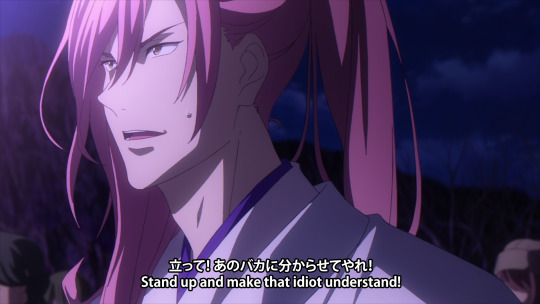
Like with Kenta in the example exchange above, kaigo funpatsu isn't about Adam atoning for his sins - it's a call for him to recognize he screwed up and move forward without making the same mistakes.
And he does, or at least he's beginning to take those steps. He recognizes the mistake that matters most to the themes of the story, and that led to everything that happened in his life since - that he lost sight of the innocent love for skating he had as a child.
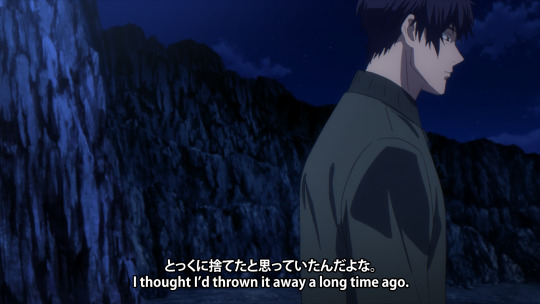
He finally admits what Tadashi meant to him;
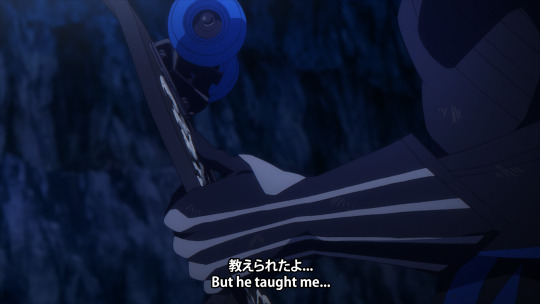
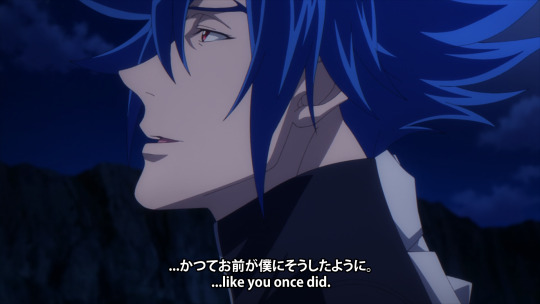
he directly defies his abusive family's wishes by working against Takano rather than throwing Tadashi under the bus;
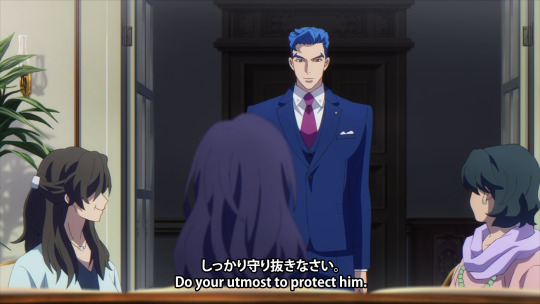
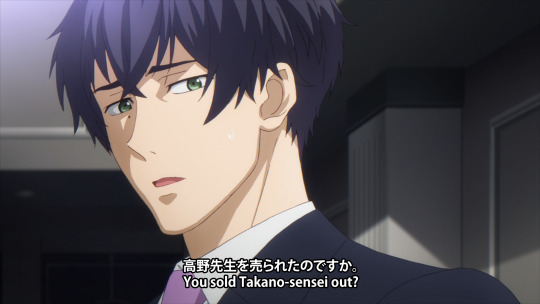
and he finally shows up as Adam in daylight, on someone else's "turf", to celebrate his own defeat - reaching out to his former friends and gracefully accepting loss, things he refused to do even an episode prior.
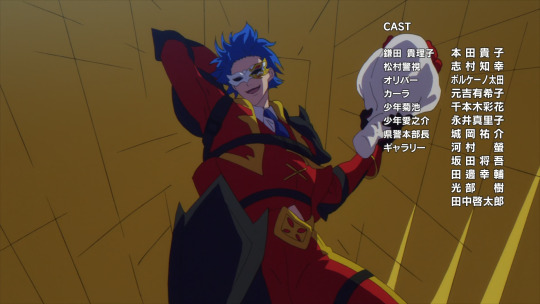
He may not be begging for forgiveness, and with this coming at the very end of the series there's a long road still ahead of him, but he's recognizing that he did things wrong and he's making an effort to move forward in a better way - and in doing that he's regained the most important thing he lost, his love of skating.
And Adam isn't the only one whose character arc kaigo funpatsu describes, either. Reki regrets his mistakes...
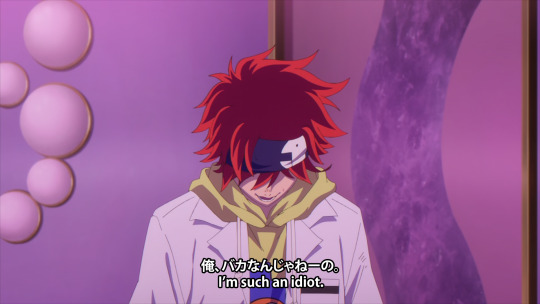
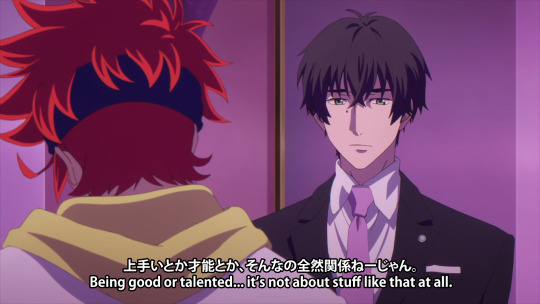
...and comes back from them.
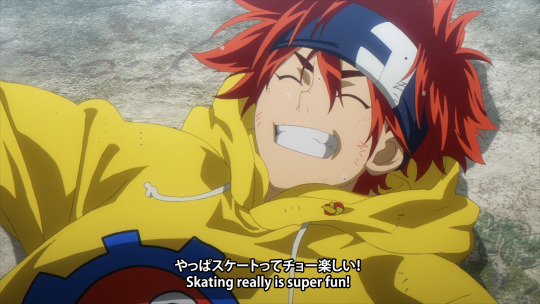
Langa recognizes his mistakes and comes back from them - and is even able to help Adam do the same.
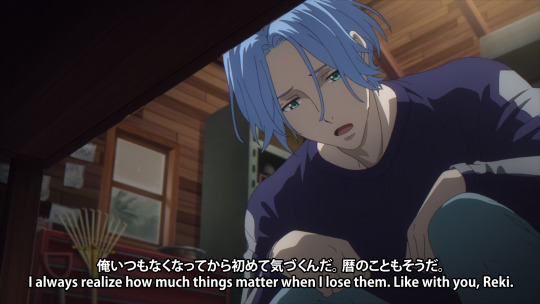
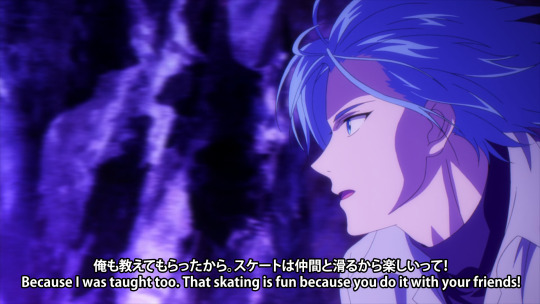
Tadashi, more clearly spelled out than anyone, recognizes his mistakes...
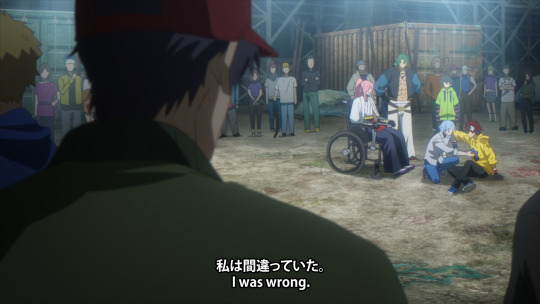
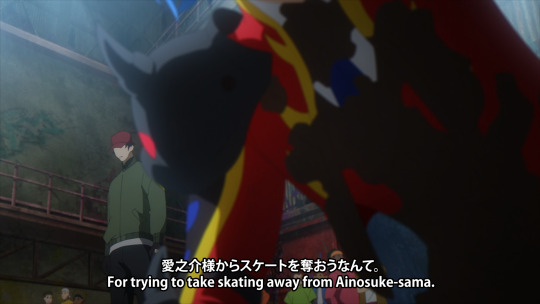
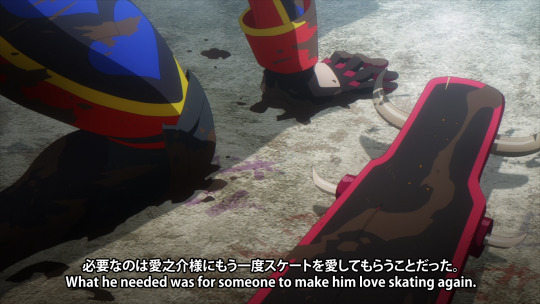
...and he's able to come back from them, too.
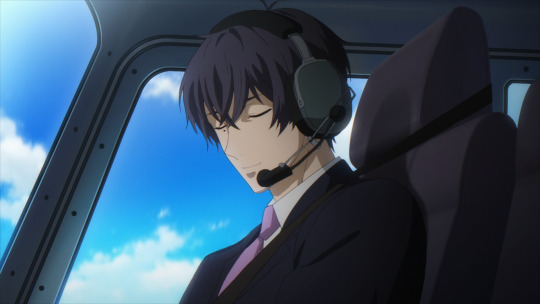
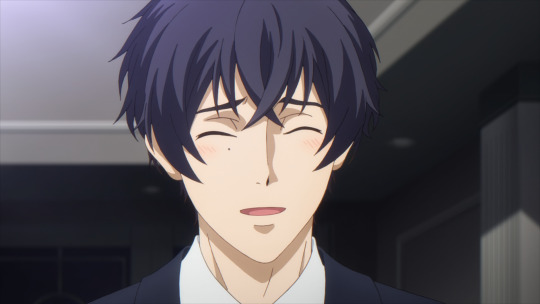
None of these resolutions involve big direct apologies, or any kind of penance to earn forgiveness. (Personal forgiveness isn't something SK8 takes much interest in dwelling on or making characters earn in the first place, and its approach to forgiveness could easily be a whole other meta in and of itself.) They don't have to, because in the end, Kaoru's idiom is not only a message to Adam - one that he ultimately does receive, if a bit later than Kaoru hoped - but a moment that spells out a big part of the show's thesis.
Everyone is going to do things wrong in their life, one way or another - but anyone who regrets their mistakes and makes an effort to do better should be able to recover from them and regain what they lost.
Only season 2 can show us what moving forward is going to look like, but when it comes to what counts to the core narrative, everyone's taken the first steps.
#sk8#sk8 the infinity#sk8 meta#meta#kaoru sakurayashiki#adam sk8#ainosuke shindo#reki kyan#langa hasegawa#tadashi kikuchi
108 notes
·
View notes
Text
So... about the "Ironwood Was Right" thing.


I recently saw this resurface a bit, in the context of Ruby's regrets in Volume 9. Basically, taking the fact that she felt like she'd failed as the show saying that yes, actually, she was wrong to go against Ironwood's plan in Volume 7.
I feel like I went into thinking about this trying to debunk it on a logical level. Like, is it actually a good idea to fly off into the sky in one big long stalling measure when your opponent is literally immortal? What's stopping Salem from grabbing all the rest of the relics and then just waiting as many generations as it takes, until the people of Atlas forget why they came up there in the first place and return to Remnant out of curiosity?
The thing is, treating it as an argument about what's the more "rational" choice is missing the point that like. We're talking about a story. We don't know exactly how many people are in Atlas and in Mantle and where they are and how many more trips they'd have to take to finish the evacuation, because details like that would just bog things down.
This is not a trolley problem with x number of people from Mantle on one side and y number of people from Atlas on the other. This is a trolley problem with a wealthy and powerful person on one track, and a disadvantaged person an alternate track, and Ironwood choosing to pull the lever instead of trying to stop the trolley. The point is not "how many." It's not about math. The point is that there is a fundamental difference between dying in the central location while a bunch of Huntresses and Huntsmen do absolutely everything in their power to protect you, and dying abandoned in the mines you used to work while the city built off of your labor flies away to safety.
The question this conflict is asking is about whether or not other people can be sacrifices. Ironwood says yes—team RWBY disagree. That's the actual crux of this argument. Does Ironwood have the right to decide who deserves protection and who isn't worth the risk? Do we get to give up on other people before we've even tried to save them? It's about the idea of certain people being disposable. Mantle's wall isn't important, Amity is. Amity will protect all of Atlas, and that wall will only help the people in Mantle. It implies that their safety is an acceptable sacrifice for the greater good. It treats them as disposable.
There's a reason it was Nora who spoke up and pointed out that it's always Mantle being asked to bear the burden for the greater good. Nora has been a disposable person before. Hell, Cinder has been a disposable person! The way Atlas (through the madame) treated a living person as a resource to be exploited or sacrificed is the entire reason that Cinder is trying to burn the kingdom down. Thematically, Atlas cannot escape the danger she poses by sacrificing more disposable people.
One of the biggest themes of this show is cooperation. It's all about how Salem can only be defeated by working together. But working together is not possible if certain people are taking on all of the risk, all of the sacrifice. Everyone has to be willing to put some skin in the game. Like, imagine trying to do a group project if you knew half of you were guaranteed to get an A no matter what and the other half weren't.
So the idea that Volume 9 is supposed to come back around and say that actually, that plan that would have literally divided a city in half and cut loose the poorer half like fucking ballast, that was the right thing all along and Ruby Rose was wrong to challenge it... that would be an absolute disaster of a thematic statement.
This is not a show about hard military men making hard military choices. It's not going to contrive a situation where cold-blooded calculation determines that the right thing to do is to pull up the ladder. Because outside of weird philosophical experiments about trolleys, the right thing to do usually has more to do with empathy. Compassion. Cooperation. All that gay shit.
#rwby#rwby volume 9#james ironwood#long post#this is kinda spicy and i may regret this but tally ho#utilitarianism makes a good scalpel#in messy situations where the right choice is unclear#but it's also very good at making excuses#“it's ok if I do x bad thing as long as it balances out”
276 notes
·
View notes
Text
💮Random Astro Notes, Answering Questions and a lil Rant💮

🪷The house that Saturn resides in can tell us what items we have been more careful and gentle with. To name a few, people with Saturn in 3rd house may have their books degrade faster, and their phones break often. Saturn in 4th need to be careful with their furniture, photos, kitchen, and even their entire home. Saturn in 7th may lose or damage their jewelry. Saturn in 11th may electronics break and malfunction.
🪷The house that Scorpio and Pluto reside in gives us some insight into how/where we are mistreated, misunderstood, taken advantage of, and perhaps even abused. However, it’s also where you’ll eventually come on top. If you thought Saturian karma doesn’t play then wait until you see Plutonian karma. Unlike Saturn, it is public and done indirectly. Because it’s the house of death (symbolically more than literally) and transformation, Pluto works slowly but on a large scale. Just like tectonic plates, they're slow and great. It may very well (especially for Scorpio) happen after your death or in a different lifetime.
🪷The Pisces paradox of being obsessed with yourself and taking pictures 24/7 and also desiring to escape your mortal flesh
🪷Side bar but I love how the sign of most season winners and of miss congeniality on Ruapul Drag Race is Taurus followed by Libra. It makes for Venusians to dominate a beauty competition show.
🪷Leo and Libra placements are obsessed with having an aesthetic. They drown themselves in whatever they find beautiful, and they do it well.
🪷I never understood the obsession with spouse, wealth, fame, and indicators in the chart. To me personally, when it comes to these subjects is that if you aren't actively trying to have or working in whichever way that suits you and seems the most effective, you won't attain it. How are you getting anything without putting an effort into it?
●∘◦❀◦∘●●∘◦❀◦∘●●∘◦❀◦∘●●∘◦❀◦∘●●∘◦❀◦∘●●∘◦❀◦∘●●∘◦❀◦∘●●∘◦❀◦∘●
Questions Asked:
🌸@brielledoesastrology thank you for the message, but I don't want to tell people about my chart 😅. I like to be as impartial as I can when it comes to doing astrology. I do it to help people and for fun not for fame or any gratification. It may seem dramatic but I swear it's easier when people don't know 😭
🌸 @spixcyy "Can I ask if you're gay?"
It's giving (Yes, I am very colorful and zesty)

🌸 Question from @iproposedtoyomamaandshesaidyes: “Heyy wassup bro how’s everything? I have Chiron in Leo is that a good placement?”
Heyy, I am good thank you and I hope you’re healthy and happy. Well, it depends on what we mean by “good”. In terms of the role of Chiron in Leo’s role in your trauma and healing.
Here are some of my interpretations of Chiron in Leo:
Sensitivity to your sense of person
Having limited self expression or authenticity (The house Chiron resides in can indicate where, how, and in some cases by whom.)
Being forced into the collective and not allowed to have a sense of independence
Individuality and unbecoming is a major life themes/struggles (regardless of the house)
Problems with self esteem, courage, vitality, creativity, and originality
Having a hard time accepting your possibilities and fearing success
Fear of disappointing role model/guide
Pressure from an early age for living a prodigy
Having to play a “role” or a character for a large portion of your early years
Trouble feeling that you do not have a central purpose or reason for existing
Difficulty understanding what it is you are ‘supposed’ to be doing with your life, yet having an overwhelming sense that you are supposed to be doing something.
Excessive rebellion or conformity
Healing and Moving on:
Learning to be content
Finding yourself as you move along life
Accepting that you won’t find instant solutions and results
Allowing yourself to grow
Forgiving yourself for being the person you were and needed to be
Helping others embrace their qualities (especially those that are viewed negatively by society) will help accept yourself
Leading with love and compassion, not detachment
As Chiron is the great healer that can’t heal his wound, your life purpose is:
To lead by example
Break the mold
Be the new “normal”
Perseverance
Act as a leader of the collective rather than be part of the group
Depending on the themes of the house Chiron resides in, you’ll work as a great motivator and healer in that aspect of life.
Hope this was of any help and thank you for your question.
🌸 @astro-lab asked :” So what is “the other Lilith” that comes with every chart? Which one is more relevant? How are they related?”
There are four asteroids that are part of Lilith.
- First, we have the Black Moon Lilith or Mean Lilith (h12), which is the most commonly used and referred to when people say “Lilith”. This is the one that is usually used in birth chart tools you find online.
The others are Asteroid Lilith (1181), True/Osculating Lilith (h13), and lastly, we have Dark Moon Lilith/ Waldemath Black Moon (h58).
Mean Lilith uses the average orbit of the theoretical Black Moon. This is why she is called Mean Lilith. “Mean” refers to the average, not her temperament. For True Lilith, her orbit oscillates or interchanges constantly. This Lilith uses the actual, real orbit of the Black Moon rather than the average in comparison. As for Dark Moon Lilith, some people have claimed to have seen this Moon, although its existence is debatable. Asteroid Lilith is the only Lilith that is an actual astronomical body.
In terms of their relevancy and importance depends on what areas of life are you looking to get insight from. Like other asteroids, they can shed light on things we tend to overlook. However, when it comes to Lilith, in general, these are things that we feel but never understand period.
The Mean Lilith is widely used because it takes the average orbit of Lilith and its mystic influence astrologically. In the birth chart, it represents the unconscious mirages that we create to protect our most vulnerable parts and deepest fears. Where we tend to be mistreated the most as Lilith had been and how can we fall victim to others but also heal, transform, and regain that power.
True Lilith in contrast is what we might now refer to as “your villain origin story”. This is where we find ourselves pushing the boundaries of ourselves and others. Our darker instincts and desires.
Asteroid Lilith is where and how we embody Lilith through the chart and in our everyday life.
I hope I was able to explain it well but thank you so much for your question 💕
●∘◦❀◦∘●●∘◦❀◦∘●●∘◦❀◦∘●●∘◦❀◦∘●●∘◦❀◦∘●●∘◦❀◦∘●●∘◦❀◦∘●●∘◦❀◦∘●
That's it, thank you for the questions and for reading.
Adios PUTAAASSSS
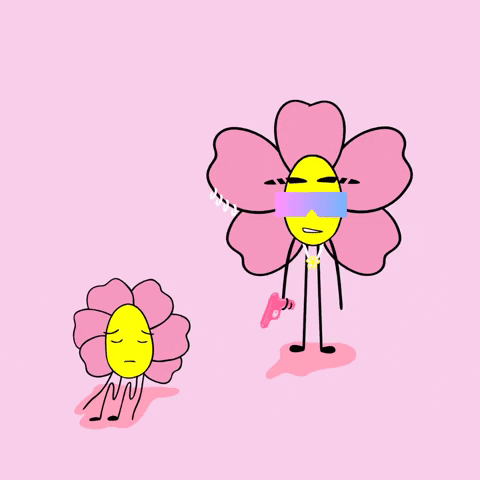
#astro notes#astro observations#astrology observations#astrology notes#astrology#aries#taurus#gemini#cancer#leo#virgo#libra#scorpio#sagittarius#capricorn#aquarius#pisces#lilith#mean lilith#true lilith#chiron#chiron in leo
520 notes
·
View notes
Text
Ok I know I normally don’t make posts like this, but I’ve seen a lot of people talk about Harry’s relationship with Dora and how strange it is that he grieved their relationship for so long. And like I get it, but your kind of missing the point? Of the game? Sure, he loved her, but it’s more than just... he was a really big wife guy or something. To Harry, Dora was a symbol of the new age, something he had built his entire identity around. When Dora left him, it was the moment that he realized the best of his days were gone and he’d lost everything.
And that’s kind of the core of his character. The whole game actually. The new age was young and bright and people thought it would last forever, but the flame burnt out and left very little behind. Harry is someone chasing down a past he can’t remember. He wants more than anything to be young and cool again and it’s his central motivation. It’s why he tries so hard to get the approval of the ravers. It’s why he obsesses over Kim for his cool factor. It’s why he steals the jackets from the wannabe skulls. It’s why the way he dresses is an important mechanic of the game and why he seeks out clothes with a 'cool' factor to them. It’s why he tries so hard to win Her back, because maybe if she’s there he’ll have his old life back and everything will be fixed.
And again, this reflects back on one of the main themes of promises left unfulfilled. Of enthusiastic energy that burns out with time and reality. Martinaise was promised revitalization. Fortress Accident and the other denizens of the cursed financial district were promised success. The revolution promised a new era. Harry was promised a marriage. The RCM promised order and security. Dolores Dei promised great progress. Etc. Etc. All fail or die before they can. And the game doesn’t portray this as hopeless. There’s beauty in the cycle. New beginnings that fall to ruin and then new beginnings that arrive from the ashes. After death, life, after life death again.
36 notes
·
View notes
Text
Kawakami’s Confidant Route Analysis (Time Management, Character Parallels, & What Kawakami’s Confidant Says About The Protagonist’s Parents)
Kawakami’s confidant route is one of my favorites in Persona 5. Mainly because of how tightly it is written.
TLDR: The protagonist is designed to be incredibly similar to Kawakami’s former student, Taiki Takase, in order for his words to emotionally resonate with Kawakami. This allows one to make inferences regarding the protagonist’s parents based on the Takases.
The entire route centers around the theme of time management. While some confidant routes will have the theming or focus only apply to the confidant themselves (and not the protagonist or other characters) this route goes the extra mile. Having all three central characters (Kawakami, The Protagonist, and the late Taiki Takase) have issues with time management. The route explores each of their struggles to get things done while not stretching themselves too thin as well as how their problems interconnect. On top of that, they even manage to work the skills into the theme, having all of Kawakami’s skills center around time management and making the most of your time.
While other routes, like Yoshida’s, change/have a different impact depending on how the player chooses to interpret the protagonist (whether the protagonist was interested in politics the entire time, got into politics over the course of the route thanks to Yoshida, or was simply humoring Yoshida in order to get better at negotiations), everything that makes Kawakami’s confidant work is built into the protagonist from the start. His issues with time management as well as the way he parallels Takase all create a reasonable justification for why the protagonist specifically is the one who is able to get through to her and strengthens their bond. In comparison to some other routes which simply gesture to some vague qualities of the protagonist that make him someone others are willing to open up to.
But there’s one part of her route that always caught my eye. Particularly, that parallel to Taiki Takase.
See, Taiki Takase was a former student of Kawakami’s and is a major player in the route despite being dead. He was a delinquent student put into Kawakami’s class that she was essentially told to let fail. After getting to know him, however, she realized that he wasn’t actually a delinquent like everyone claimed. Instead, he simply had a variety of extenuating circumstances that made school a bit difficult for him. Mainly, he had a problem with time management, working multiple jobs on top of school, which often resulted in him missing class and not having time to study. Learning about this, Kawakami decided to use the skills at her disposal to help Taiki and make things easier for him (sound familiar?). In this case, it was mainly offering to help him study or review at unconventional hours. Adapting her schedule to his, rather than the other way around.
Ultimately, the school chastised Kawakami for helping Taiki after hours and forced her to stop. Taiki said he didn’t blame her, but that same day he got into a car accident and died, resulting in Kawakami harboring a great deal of guilt regarding his death. A guilt that is only exacerbated by his guardians hounding her for money as recompense, resulting in her having to take on the maid job to make ends meet.
This all leads to where Kawakami is at the beginning of the game. A jaded and exhausted teacher too tired to care and too jaded to try. That is, until she meets the protagonist.
The protagonist. Who, just like Taiki, is a delinquent student put into Kawakami’s class that she is essentially told to let fail. Who, after getting to know him (despite her best efforts not to), Kawakami realizes isn’t actually a delinquent like everyone claims. Instead, he too simply has a variety of extenuating circumstances that make things a bit difficult for him. His record, sure, but also a problem with time management, as he works multiple jobs on top of school (Flower shop, beef bowl shop, Crossroads, Leblanc, etc on TOP of Phantom Thieving), which often results in him struggling to balance his mess of a schedule.
The protagonist is Taiki. At least, in Kawakami’s eyes. A mirror of the student she failed. Who she let die to save her own skin. Only, this time? Kawakami refuses to let him die.
So she helps him, just like she helped Taiki, using the skills she has at her disposal. Except, this time, it’s not study sessions at midnight after getting out of work. It’s doing the laundry while the protagonist rushes off to do something else. Because sometimes, when you’re tired and stressed and have ten different things on your plate, you just need someone to do the laundry for you. Or make dinner. Or make you a coffee as a pick me up.
Just like how Taiki just needed someone who was willing to meet him where he was. To work with his schedule rather than against it. To understand his situation and be willing to help him catch up on what he missed rather than berate him for not being in class.
It’s this parallel that gets the protagonist’s words to resonate with Kawakmi. Because, when he tells her that it’s not her fault that Taiki died and that she shouldn’t be working herself to the point of hospitalization to atone for something she didn’t do, it feels like Taiki’s saying it. It reminds her of how Taiki insisted he didn’t blame her when she told him she’d no longer be able to help. How likely the last thing he ever told her was that it wasn’t her fault.
And here the protagonist is. So much like Taiki in every way. Insisting that it wasn’t her fault too. How could she not listen to him?
The parallel between Taiki Takase and the protagonist ultimately exists in order for the protagonist to reach Kawakami. That parallel is what fuels their bond and pushes the route forward, but it also lends to some interesting analysis of the protagonist. After all, Taiki and the protagonist are supposed to be functionally the same. Meaning that we can look to Taiki for information about the protagonist. Mainly, regarding his parents.
Everyone has their own headcanons on what the protagonist’s parents are like. But I base my interpretations on more than assumptions and minor lines in the beginning of the game. I base mine on NARRATIVE PARALLELS!
Bear with me here, I’m gonna go on a bit of a tangent.
In Persona 4, the protagonist (who I’ll be referring to as Yu for the sake of not getting him mixed up with P5 protag) is sent to Inaba to live with his Uncle Dojima and cousin Nanako. And, in P4, the relationship between Dojima and Nanako is supposed to directly parallel the relationship between Yu and his parents.
See, the tension in Dojima and Nanako’s relationship comes from Dojima’s work habits. Lately, he’s become more and more busy with work. Spending less time with his daughter and more time absorbed into case files. Their relationship mends when Dojima finally steps back from his work and decides to put more effort into being home. Realizing that his relationship with his daughter would continue to deteriorate unless he actively worked to spend more time with her.
In that same vein, why was Yu sent out to Inaba? Right! Because his parents were busy with work. Specifically, his parents are working abroad for an entire year. And, rather than taking him with them, they’re shipping him off to stay with his Uncle.
Yu’s relationship with his parents is supposed to parallel Dojima and Nanako. To be an example of what would have happened had Dojima not fixed his relationship with his daughter. If he continued to bury himself in his work. Where a few late nights turn into multiple weeks apart which turn into full years away from his daughter. Getting to the point where the protagonist is. Where his parents spend so little time with him that they’ll send him off for an entire year to focus on their own work.
You never meet Yu’s parents. They’re barely mentioned. But, through narrative parallels, you can understand what they are like without the story ever having to show them. This too, can be said of P5.
The protagonist of P5 parallels Taiki Takase. For the sake of Kawakami’s confidant route, they are supposed to be functionally the same. Meaning, we can reasonably assume that the Takases (Taiki’s guardians) are similar to the protagonist’s parents. And, considering the fact that the Takases are Mementos targets, that pretty much confirms that they’re horrible people.
But wait! I hear you say! The Takases aren’t Taiki’s biological parents, they’re his guardians (aunt and uncle)! Just like the protagonist, Taiki isn’t staying with his parents when Kawakami meets him, but with a guardian instead (furthering their similarities). Wouldn’t it be more accurate to compare the Takases with Sojiro?
Good point! However I don’t believe that to be the case. Why? Well, to put it simply, because Sojiro is a good person.
See, remember my P4 tangent? In that, there is a difference between the relationship between Yu and his parents and the relationship between Nanako and Dojima. Mainly, that Dojima fixes his relationship with his kid while Yu’s parents don’t.
That difference is there for a reason. It isn’t a pointless change, it’s an intentional one. Done to show what could’ve been if Dojima didn’t fix his relationship with his daughter.
Say Sojiro is meant to be compared to the Takases. If that was the case, one would assume that the protagonist’s situation differs in some way from Taiki’s due to the fact that he has a kinder guardian that actually cares about him. Showing how the protagonist was able to better handle his difficult situation with Sojiro’s help.
Except, that isn’t the case. Sojiro has little to no impact on the protagonist’s problems when it comes to Kawakami’s route. The protagonist struggles just as much as Taiki does, with only Kawakami being the one to make an impact on either of them (when it comes to the issues Kawakami’s route focuses on). The difference instead coming from the fact that she refused to stop helping the protagonist when she had previously caved and stopped helping Taiki.
Because of this, I can’t believe that Sojiro is supposed to parallel the Takases. Instead, it has to be the protagonist’s parents. Which implies that the protagonist’s parents are garbage and a source of a great many problems for the protagonist (just as the Takases contributed to many of Taiki’s problems). That, just like the Takases, they intentionally put him down in order to feel better about themselves. That they’re the kind of people who, if the protagonist had died only to be proven innocent, would’ve happily accepted the sympathy and recompense despite never actually caring for their child.
So yeah! That’s why I adore Kawakami’s confidant route. Honestly, I expected it to be a trainwreck from its premise alone. But, instead, I was pleasantly surprised. It’s one of the most polished confidant routes in the game and I honestly wish more routes followed in its footsteps.
Particularly Chihaya’s, which had the opportunity to take advantage of certain narrative parallels in order to delve deeper into the protagonist’s past (as well as his relationship with Ryuji), but instead ignores this in favor of the ADP. It’s still a good route, with a frankly fantastic start, but I still wish they did more with her.
But, hey! That’s a discussion for another time. With that said, I hope you enjoyed the analysis!
#persona 5#persona 5 royal#persona series#persona 5 protagonist#ren amamiya#akira kusuru#sadayo kawakami#sojiro sakura#chihaya mifune#persona 4#yu narukami#nanako dojima#ryotaro dojima
149 notes
·
View notes
Text
meta knight would really really like revolutionary girl utena but unfortunately he would miss the entire point. dedede would be like “mety you’re right this show is great. i like how the central theme is a commentary on the patriarchy and how defined gender roles like ‘prince’ or ‘princess’ are inherently toxic and lead to nothing but eternal torment” and meta knight would go “please quiet down your majesty i want to watch the noble pink girl beat the green man to death with her magical sword”
#meta knight no. the show is critiquing the very tropes you have built your identity on. metaaaaaaaa#meta knight#kirby#king dedede#revolutionary girl utena
72 notes
·
View notes
Text
with the conclusion of Snowfall...
why do i enjoy Republican Era chinese dramas so much?
aesthetics! there is this blend of 1920-30s western fashion influences and traditional chinese garb & architecture that just pleases my eyes.
everyone looks very depressed & dangerous & sexy
chaotic period of transition - no matter if you're in the 1910's, 20's, 30's some absolutely wild historical shit was going down
cars and guns and gloves and swords. rotary phones!
dancing & drinking in night clubs, in glamorous pockets amid the violence & instability outside; a lil touch of mask of the red death vibes
end of empire themes, as a country tries to find its way after the end of the last imperial dynasty
there's those gangster, mob boss vibes from american and british dramas set in the 1920s, except everything is cranked up x100 because of general lawlessness; central government and law & order was a paper thin veneer over warlords
the start of WW2 from an entirely different perspective than the common narratives that I was exposed to growing up in the US (which is 99% stories about the european stage)
sino-japanese war / war of resistance material like Hidden Blade is fucking badass ok 🤷
in a time of resistance to occupation, colonizers encroaching, warlords fighting over cities, brewing civil war.... there are many different options of protagonists and unlikely "heroes" who are picking their battles and discovering what they are willing to fight for
Beautiful 👏 women 👏 in heels 👏and 👏 slinky 👏dresses 👏
Lots of revenge narratives. I love an over-the-top, bloodthirsty & destructive revenge narrative
Depending on the genre, there might be little or heavy politcal /patriotic discourse. But tbh none of the rah rah patriotism stuff distracts me much, because all the american and british produced stuff set around WW2 has rah rah patriotism & propaganda in it, so I just consider that part of the essential genre vibes. It's just another country's version. (Of course, others will have less patience when it becomes heavy-handed. YMMV.)
Dark & Gritty
Hidden Blade (film) - a masterpiece, if you enjoy dark WW2 spy films that play with narrative style and challenge the viewer to follow the story as it's woven. Had to review detailed historical context for the years in question, to be ready to consume. But worth it. I've watched it 3 times. 💀
Heroes (2024) - the very beginning era of this genre/the transition into repulican period. rocks fall, everyone dies. Primarily a tragic wuxia & pre-republican fusion. Excellent enough that I didn't mind the bleak storyline. 💀
Detective-ing
Miss S - adaption of 1920s Australian mystery procedural Miss Fisher's Murder Mysteries, staring Vengo! ML actor of Snowfall
Checkmate - Agatha Christie stories adapted to the setting & time period, plus bromance. I watched half the episodes w my brother, as we are both huge agatha christie fans. It was fun if you can be chill about adaption changes.
My Roommate is A Detective - for mystery & bromance lovers. Same actor duo as Checkmate.
Detective L - don't know much about this one tbh
Romance arc, with a somewhat happy ending for the 2 leads
Provoke - Gorgeous, glamorous, vibes vibes vibes all day long. Revenge and romance. ❤
Fall in Love - sons & daughters of warlords and their supporters get sexy and dangerous and decide even joining the civil war is better than the prior generation's bullshit. This is an objectively bad drama that I really enjoyed anyway (it helps that I skipped every scene for the 2nd and 3rd couples). This one turns v propaganda heavy at the end, if that bothers you. ❤
Arsenal Military Academy - military training hijinks w a side of cross dressing romance. Xu Kai and Bai Lu! It's soliders and japanese invasion et al, so be prepared for the standard patriotism. Comedy & drama. HE for the FL/ML but expect character death in this subject matter. ❤
Rookie Agent Rogue - Late 1930s spy drama with small romance side-plot. Expect the standard wartime patriotism, like with Arsenal Military Academy. The draw is the lead actress, the FL from Princess Agents, Minglan, Legend of Shen Li. HE for the FL/ML but expect character death in this subject matter. ❤
City of Streamer - Older woman seduces younger man who is the son of her revenge target. Melodrama with people serving looks. ❤
War of Faith* - Young man just wants to join the banking industry and have a subtextually gay relationship with his mentor in peace, but there's a civil war going on. Protagonist would like to be excluded from this political narrative, but ultimately is forced to pick a side. ❤🌈 *(Is it censored gay romance? No, not based on a gay novel. So not officially! But some viewers felt there was a subtextual romance storyline #shenlai ; YMMV. The happy ending is Untamed-esque; implied only)
many, many pulpy mini-dramas about revenge! warlords! ladies with pistols! (Miss Mystery, First Marriage, Maid's Revenge, etc)
Also... (happy ending not guaranteed)
Siege in Fog
Love in Flames of War
Couple of Mirrors - censored F/F 🌈
Stand by Me - censored m/m 🌈
Killer and Healer - censored m/m 🌈
Winter Begonia - censored m/m 🌈
#cdrama#cdrama recs#drama recommendation#silvia recs#there are even more sad ending ones out there#i just usually avoid BE dramas#so i am not who to approach for a full list
53 notes
·
View notes